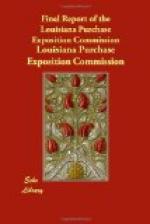at Philadelphia, must be struck with the progress
made by our States and cities and even by the
individual colleges toward uniform statistical schemes.
The impulse to this important result came undoubtedly
from the United States Bureau of Education, whose
statistical representation of education in this
country, current and retrospective, is one of
the most valuable features of the entire exposition.
As this material, however, is placed in the Government
building, its consideration does not come within the
province of the regular juries.
By means of the two media—photographs and statistics—a very complete representation of a school system is possible with great economy of space and special regard to essential particulars. The extensive exhibits of pupils’ work from our own schools show remarkable similarity in methods and results throughout the country; this similarity extends even to the rural schools, which, in the case of some particular districts, present work well up to the average of neighboring cities. There are also signs that the rage for “newness” has subsided; the work shows closer sequence and more systematic treatment of subjects than that exhibited at Paris. Correlation, for instance, is not so promiscuously applied, but limited to subjects whose relations are obvious, as geography and history, etc.
The impulses toward nature as the inspiring motive in art instruction and toward social activities as factors in school training have been felt in other countries than our own. Germany has replaced the conventional art instruction by a system based upon the study of natural forms, growths, and coloring, and Belgium presents a remarkable object lesson in the use of local products and industries in a progressive scheme of practical instruction. The skill with which Sweden has reduced domestic art and sloyd[1] to pedagogic form was already well known in this country, but it has excited new interest by its presentation here in one of the most admirably systematized and suggestive exhibits in the collection.
[Footnote 1: a system
of manual training in woodwork, having
originated in Sweden. (note
added when transcribed to etext)]
School architecture forms an impressive feature of many of the exhibits. Germany has made a very full presentation under this head by means of photographs, plans, and complete models. Argentina has an unrivaled collection of photographs, showing palatial school buildings of noble design and well-planned interiors. In this connection may be mentioned a device of a portable schoolhouse for use in congested city districts pending the erection of permanent buildings. The models shown were from St. Louis and Milwaukee.
The great movements now in progress in our country, as indicated by the exhibits, are, in the States at large, the improvements of the rural schools, particularly by the consolidation




